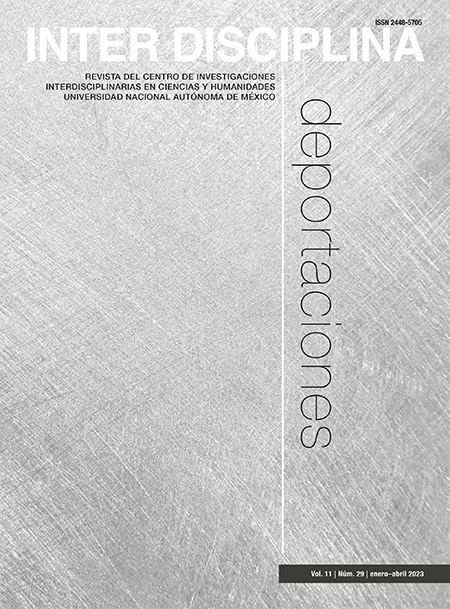The Mexican Congress facing the immigration issue: convergences and divergences of partisan positions in the LXIV Legislature
Main Article Content
Abstract
The problem and objective here is to study the positions of the political parties before the serious migratory problems in Mexico. The first year of the LXIV Legislature of Congress, was defined as a case that coincides with the hegemony of the same party in the government. The analysis is quantitative and qualitative, it characterizes such positions and identifies convergences and discrepancies, based on three variables: integration of commissions, proposals on the agenda and bills, and proposals for agreement that each party presented. The results showed that irrelevant proposals predominated to adapt the legislation, reactive agreements towards migration policy, the reluctance of the ruling party towards proposals from minorities to render accounts, allocate more resources and support the work of civil organizations, and a precarious vision that does not. It takes advantage of advances in the investigation of migratory phenomena. This analytical approach is replicable for other matters of legislation and public policy, and longitudinal studies would further contribute to public scrutiny and discussion of alternatives.
Downloads
Article Details
Citas en Dimensions Service
References
Bobes, Cecilia. 2012. El transnacionalismo como enfoque. Una reflexión para construir un modelo analítico. En Cecilia Bobes (ed.), Debates sobre transnacionalismo. México: FLACSO, 9-23.
Bobes, Cecilia y Pardo, Ana. 2016. Política migratoria en México: legislación, imaginarios y actores. México: FLACSO.
Castles, Stephen. 2004. The factors that make and unmake migration policies. International Migration Review, 38(3): 852-884.
Coraza, Enrique. 2020. ¿De qué hablamos cuando nos referimos a las movilidades forzadas?: una reflexión desde la realidad latinoamericana. Revista de Estudios Políticos, 57.
Domenech, Eduardo. 2013. ‘Las migraciones son como el agua’: hacia la instauración de políticas de ‘control con rostro humano’. Polis, 12(35): 119-142.
Faist, Thomas. 2000. The volume and dynamics of international migration and transnational social spaces. Oxford: Oxford University Press.
Fernández de la Reguera, Alethia. 2019. ¿Qué sucedió una vez que la primera caravana migrante salió de Chiapas? En Caravanas migrantes: las respuestas de México. México: UNAM, 33-42.
Frelick, Bill, Kysel, Ian y Podkul, Jennifer. 2016. The impact of externalization of migration controls on the rights of asylum seekers and other migrants. Journal on Migration and Human Security, 4(4): 190-220.
Gandini, Lucia. 2019. Las ‘oleadas’ de las caravanas migrantes y las cambiantes respuestas gubernamentales. Retos para la política migratoria. En Caravanas migrantes: las respuestas de México, México: UNAM, 23-31.
Izcara, Simón. 2015. Los transmigrantes centroamericanos en México. Latin American Research Review, 50(4): 49-68.
Martínez, José y Ortega, Adriana. 2015. Internalización de normas internacionales en materia de derechos de migrantes. El caso de Chiapas. Norteamérica, 10(1): 191-213.
Massey, Douglas, Durand, Jorge y Malone, Nolan. 2009. Detrás de la trama. Políticas migratorias entre México y Estados Unidos. Zacatecas, México: Miguel Ángel Porrúa.
Meckling, Jonas, y Nahm, Jonas. 2018. The power of process: state capacity and climate policy. Governance, 31(4): 1-17.
Mirra, Alessio. 2018. Las fronteras del siglo XXI. La externalización y la desnaturalización de los espacios de transición. Iberoamérica Social, IX: 111-130.
Narváez, Julio César. 2019. Hasta topar con pared. Historia reciente de la migración en tránsito por México. En Caravanas migrantes: las respuestas de México. México: UNAM, 11-21.
Ortega, Elisa. 2020. ¿México como tercer país (in)seguro? El asilo como derecho humano en disputa. México: UNAM.
Ortega, Elisa y Pérez, Montserrat. 2020. Migración forzada, derechos humanos y niñez. México: UNAM.
Piché, Victor y Dutreuilh, Catriona. 2013. Contemporary theories as reflected in their founding texts. Population, 68(1): 141-164.
Podkul, Jennifer y Kysel, Ian. 2015. Interdiction, border externalization, and the protection of the human rights of migrants. Working paper. Human Rights Institute of Georgetown Law.
Sandoval Ulloa, José. 2017. Prontuario de términos y procedimientos más usados en el trabajo parlamentario de la Cámara de Diputados del Congreso de la Unión. México: Lagares.
Secretaría de Gobernación. 2019. Boletín mensual de estadísticas migratorias. México: Unidad de Política Migratoria, 65.
Thouez, Colleen y Channac, Frédérique. 2006. Shaping international migration policy: the role of regional consultative processes. West European Politics, 29(2): 370-387.

Esta obra está bajo una Licencia Creative Commons Atribución-NoComercial-SinDerivar 4.0 Internacional.





